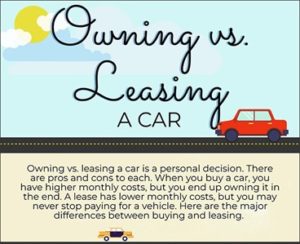ACCC provides consumers with the facts to help make the car buying process simpler
Boston, MA – June 11, 2018

“Deciding whether to own or lease a car can be a hard decision, especially because both options come with a specific set of pros and cons,” said Steve Trumble, President, and CEO of American Consumer Credit Counseling. “In the end, it is a personal decision that consumers must make based on their budget and driving needs.”
There are pros and cons to each. When you buy a car, you have higher monthly costs, but you end up owning it in the end. A lease has lower monthly costs, but you may never stop paying for a vehicle. According to Carfax, a car will lose 10 percent of its value as soon as you leave with it and up to 20 percent after the first year.
ACCC provides consumers with a helpful video and a list of facts about owning vs. leasing a car.
OWNING A CAR:
- You own the car and get to keep it as long as you want.
- The up-front costs include the cash price or a down payment, taxes, registration, and other fees.
- Monthly loan payments are usually higher because you’re paying off the entire price of the vehicle.
- You can sell or trade in your vehicle at any time. Money from the sale can be used to pay off any loan balance.
- At the end of the loan term, you may have equity to help pay for your next car.
LEASING A CAR:
- You must return the vehicle at the end of the lease unless you decide to buy it.
- Up-front costs can include the first month’s payment, a security deposit, an acquisition fee, a down payment, and other fees, including potential gap insurance.
- Monthly payments are less because you’re only paying for the vehicle’s depreciation during the lease term.
- Most leases will include limits on the number of miles you can drive. You’ll have to pay extra fees for exceeding your limits – often a specific charge per mile. For individuals who drive a lot, that can be extremely costly.
- Most leases will hold you responsible for exceeding normal wear and tear.
While there are many facets to car buying, take it one step at a time. Researching inventory before heading to a dealership can save time. It can help you narrow down vehicle choices by price, condition, make, model, and more. It can also help you learn about potential deals and discounts around holidays or end-of-month sales. Buying close to home also has the added benefit of being able to take the car in for repairs under warranty.
ACCC is a 501(c)3 organization that provides free credit counseling, bankruptcy counseling, and housing counseling to consumers nationwide in need of financial literacy education and money management. For more information, contact ACCC:
- For credit counseling, and student loan counseling call 800-769-3571
- For bankruptcy counseling, call 866-826-6924
- For housing counseling, call 866-826-7180
- Or visit us online at ConsumerCredit.com
About American Consumer Credit Counseling
American Consumer Credit Counseling (ACCC) is a nonprofit credit counseling 501(c)(3) organization dedicated to empowering consumers to achieve financial management through credit counseling, debt management, bankruptcy counseling, housing counseling, student loan counseling and financial education concerning debt solutions. To help consumers reach their goal of debt relief, ACCC provides a range of free consumer personal finance resources on a variety of topics including budgeting, credit and debt management, student loan assistance, youth and money, homeownership, identity theft, senior living, and retirement. Consumers can use ACCC’s worksheets, videos, calculators, and blog articles to make the best possible decisions regarding their financial future. ACCC holds an A+ rating with the Better Business Bureau and is a member of the National Foundation for Credit Counseling® (NFCC®). For more information or to access free financial education resources, log on to ConsumerCredit.com or visit https://www.consumercredit.com/debt-resources-tools/
